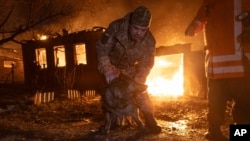The U.S. Senate is working through the weekend on a $95.3 billion military aid package, of which about $60 billion would go to support Ukraine’s defensive war against Russia.
Late Friday, 64 senators voted in favor of the bill while 19 voted against it. Fourteen Republicans joined Democrats to move the proposal toward the next stage while facing objections from a core group of Republicans — more closely aligned with the GOP’s presidential front-runner, Donald Trump — who don’t consider U.S. support of Ukraine against Russia a priority.
Majority Leader Chuck Schumer told the senators he would be willing to amend the package to win over more support, but the New York Democrat also warned they would stay in session “until the job is done.”
Even if the foreign aid package clears the Senate with possible Sunday voting, the package still faces a deeply uncertain fate in the House. In that chamber, the Republican majority is even more opposed to helping the U.S. ally in Europe, as the war between Ukraine and Russia enters its second year.
Meanwhile, U.S. President Joe Biden on Friday decried a Republican delay on approving new U.S. aid to Ukraine.
“The failure of the United States Congress, if it occurs, not to support Ukraine is close to criminal neglect. It is outrageous,” Biden said in the White House Oval Office alongside German Chancellor Olaf Scholz.
Scholz made a whirlwind stop in Washington to support Biden’s efforts to gain funding for Ukraine.
Scholz addressed growing concerns in Europe about the standoff between the Democratic president and House Republicans on Ukraine funding.
“Without the support of [the] United States, and without the support of the European states, Ukraine will have not a chance to defend its own country,” Scholz said.
Former Polish President Lech Walesa also visited the U.S. capital this week to rally for renewed U.S. military aid to Ukraine. The 80-year-old labor leader turned politician and Nobel Peace Prize winner said the world currently has a unique opportunity to force political change in Russia and should not let it pass.
“The whole world has joined together against Russia. It has never been like this. It’s our great opportunity to finally put some order into this world,” Walesa said in an address on February 8 at the Center for Strategic and International Studies, or CSIS, a Washington policy group.
Walesa said he came to Washington mainly to underscore the importance of commanding the information space and to encourage the country not to retreat from its leadership role, VOA sister organization RFE/RL reports.
The United States has been Ukraine’s largest supplier of military assistance in the war, but that help is stalled while Congress wrangles over a bill providing aid to Ukraine, Israel and Taiwan.
Meanwhile, Ukrainian President Volodymyr Zelenskyy condemned the latest Russian attack on Kharkiv, writing on February 10, that “terror cannot go unpunished” and that “Russia must be held accountable for every life it has ruined and destroyed,” The Kyiv Independent reports.
A Russian drone attack struck a gas station in Kharkiv overnight on February 10, triggering a large fire that engulfed 15 residential homes and killed at least seven people, including three children.
Kharkiv Mayor Ihor Terekhov later reported that 57 people had been injured in the attack and declared February 11, as a day of mourning in the city.
According to Zelenskyy, four people were rescued and dozens of others have been evacuated from their homes.
Serhii Bolvinov, head of Kharkiv Oblast police’s investigative department, reported on Facebook that an entire family was burned alive in their home. The youngest child was less than one year old.
“It is impossible to identify the body of the baby at the scene. The burning temperature was such that the bones and the baby’s body almost turned to ashes,” Bolvinov wrote.
Due to its proximity to the Russian border, Kharkiv and the surrounding oblast are frequently targeted by Russian drones and missiles.
Some information for this report was provided by The Associated Press, Agence France-Presse and Reuters.

